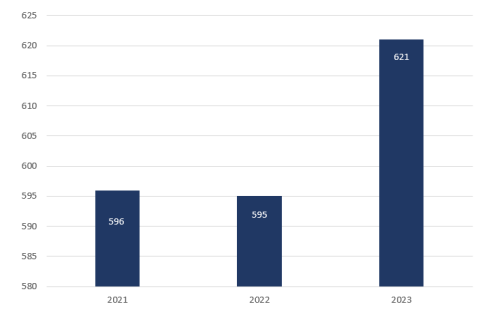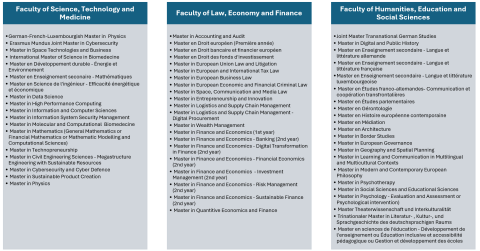Address
Unité nationale d'Eurydice
ANEFORE ASBL
eduPôle Walferdange
Bâtiment 03 - étage 01
Route de Diekirch
L-7220 Walferdange
Tel: +352 247 85289
E-Mail:info@anefore.lu
Website: www.anefore.lu
Master programmes allow students to deepen their knowledge and give them access to research studies.
Branches of study
To obtain a master degree, students have to accomplish a programme of 60 to 120 ECTS credits. Added up with their bachelor/ previous diploma, the minimum number of ECTS credits has to be at least 300 (bachelor included).
Just as bachelor programmes, master programmes are organised in modules comprising at least 30 ECTS credits. Modules are composed by one or several course units representing at least one credit, i.e. 25 to 30 hours of work.
Full-time students have to complete their master programme either in four semesters (for programmes of 60 ECTS credits) or in eight semesters (programmes totalling more than 120 ECTS points).
The following table shows the different programmes provided by Luxembourg University's three faculties:
- Faculty of Science, Technology and Medicine
- Faculty of Law, Economy and Finance
- Faculty of Humanities, Education and Social Sciences
(Source: uni.lu)
Admission requirements
To be admitted to a master programme, students need:
- Either to hold a Bachlor’s degree
- Or to hold an educational qualification entered in the Register of the Educational and recognised by the Ministry of Research and Higher Education.
Alternatively, students may take an entrance examination organised by the University of Luxembourg or request validation of prior and experiential learning:
- Validation of professional experience for an activity of at least three years
- Validation of acquired experience for an activity of at least three years
- Validation of studies already completed.
A diploma recognition is compulsory for:
- any student who does not hold a bachelor’s degree corresponding to at least 180 ECTS according to the framework of the Bologna process
- any student holding a university degree issued by a State outside the European Union, the European Economic Area or the Swiss Confederation.
The university may define additional submission criteria corresponding to the contents and objectives of the different study programmes.
Curriculum
General standards and duration of master programmes are fixed by the law. For example:
- Programmes have to comprise 60 to 120 ECTS credits
- Programmes leading to master’s degrees are multilingual, except in cases where the study programme does not allow it
- Within a bilingual study programme, at least 20% of the ECTS credits must be acquired through courses given in each of the two languages in which the programme is taught
- At least 20% of the ECTS credits must be acquired through courses given in each of the languages in which the programme is taught.
Within this framework, the University enjoys pedagogical, scientific, administrative and financial autonomy. Each faculty defines programmes, which are based on modules. For each module, the faculty defines the objectives, contents, admission criteria, modalities, duration and terms of evaluation.
Teaching methods
Academic staff enjoys pedagogic and academic freedom. Teachers are free to choose their own teaching methods and materials.
Progression of students
Master programmes are subdivided into modules. The faculty may define the access preconditions to certain modules (Art. 19 of the regulations of the University of Luxembourg).
Employability
Labour market access of master students is fostered by initiatives such as:
- The service Career Centre, which provides vocational guidance and supports students who prepare applications and job interviews
- The annual event UniCareers which allows students to meet potential employers
- The implication of professionals from the sectors corresponding to the study programmes
- Initiatives such as the Incubator & Entrepreneurship Programme.
Student assessment
Each course comprises an appraisal of the students’ aptitudes and knowledge. Evaluation is either based on a continuous monitoring, on a summative examination or on a combination of both.
Marks are established on a scale from 0 to 20:
- 10 to <12: 'passable'
- 12 to <14: 'assez bien'
- 14 to <16: 'bien'
- 16 to <18: 'très bien'
- 18 to 20: 'excellent'.
Modules are ratified if a student has passed all the evaluations, has acquired all ECTS points foreseen and has obtained an average mark of at least 10 of 20 (weighting is based on ECTS points).
Grades are awarded when all ECTS credits foreseen have been acquired and validated.
The grade figuring on the master’s diploma is determined by the average of all weighted marks.
Master theses are assessed by a jury composed of two members, one of which must be a member of the professorial staff or of the external teaching/research staff, with the possibility of an invited third jury member from the sector concerned.
Certification
The chart below illustrates the total number of master degrees issued in 2021, 2022 and 2023:

(Source: Key figures for higher education 2023/2024, p. 40)
The diploma includes at least the full name, date and place of birth of the holder, the degree awarded, the title of the programme and the signature of the Rector. The diploma is accompanied by a diploma supplement which describes the knowledge and skills acquired by the holder.
The master’s degrees granted by the University of Luxembourg are automatically included in the register of higher education certificates and deposited at the Ministry of Research and Higher Education.

